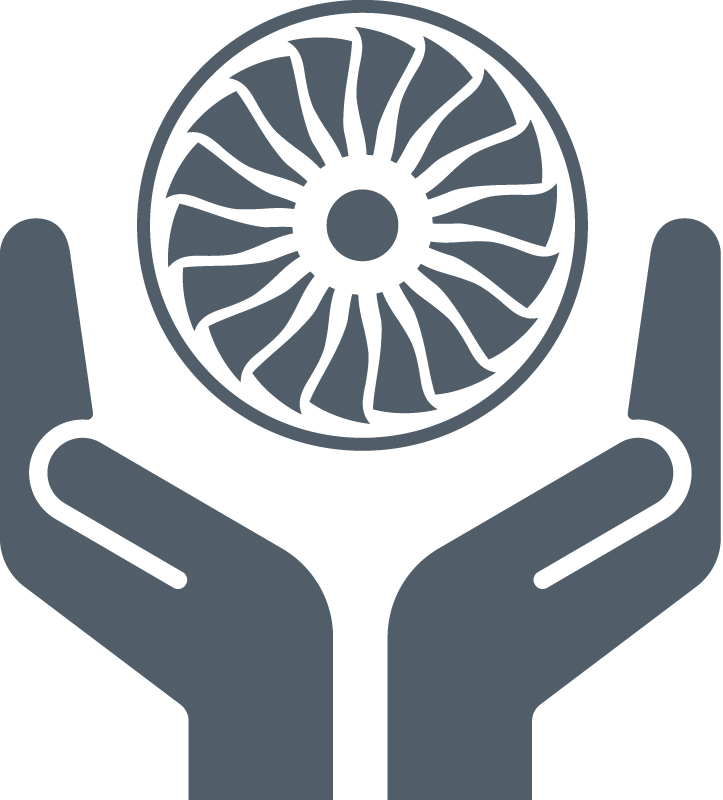Employees
Collaboration and leadership
Every day, we work closely together with international partners to advance aviation and thus global progress. Our industry operates on a global scale. This makes MTU a global player with core values of openness to other cultures, diversity, and tolerance.

Good cooperation and reliable leadership are important pillars of our success. We rely on a culture that is open to change, relies on the decision-making authority of employees (empowerment), and promotes entrepreneurial action and a digital mindset. At MTU, the further development of our corporate culture is an overarching goal. We measure our progress using an annual maturity index in defined focus areas, the results of which validate our path for 2023. We ensure MTU’s innovative strength and success through our willingness to change and through cooperation based on trust. Moreover, the forward-looking, intensive training of our workforce, the promotion of diversity, and a safe and inclusive working environment pave the way for each and every employee to develop to the best of their abilities and keep MTU on the path to success. Thanks to strong teamwork between centers, departments, and across locations and countries, we once again achieved top performance in 2023.
MTU’s roadmap for the further development of its corporate culture highlights the following priorities for the coming years: strengthening diversity and internationality, entrepreneurial action at all levels, digital thinking, networking and collaboration, as well as a focus on hybrid working.
Fast facts: #MTUfamily

employees work at our locations worldwide.

of employees firmly believe in MTU’s future.

is a turnover rate that indicates solid cohesion.
Connected teams in a creative environment
As the Director of Labor Relations, the CEO is responsible for employment matters. MTU’s human resources department sets policy in line with our corporate strategy. It also assists in efforts to achieve our long-term corporate and growth targets. The full Executive Board receives regular reports on human resources policy. Responsibility for successful implementation lies with local human resources departments and the respective technical departments and managers.
The HR strategy, which was updated in 2023, comprises six core components that are intended to secure MTU’s profitable growth course: strategic HR planning, talent management, management development, employer attractiveness, adaptation of the HR organization, and adaptation of the IT systems. The continuous development of leadership values, innovation management, and an innovative corporate culture underpins the company’s overarching vision: “We shape the future of aviation.”
Our global team
Employees by region
GRI 2-7: Total workforce of fully consolidated sites as at the end of 2023; proportion of female employees measured against active workforce. For composition of workforce sizes and scope of consolidation, see the GRI Index.
In the 2023 financial year, MTU had 12,170 employees worldwide, 8% more than in the previous year (11,273 employees). The MTU team has grown in all regions and at all fully consolidated sites. At 93.1%, the majority of MTU’s total workforce continued to be located primarily in Germany (80.4% of the total workforce); 6.9% of the workforce was employed in North America. We emphasize long-term employment relationships, and the proportion of permanent employment contracts is traditionally very high (2023: 94.2%).
MTU’s strong cohesion is reflected in its low turnover rate. In 2023, it was 4.4%. The degree of loyalty to our company remains high, with an average length of service of around 14.5 years (Germany, measured in terms of active workforce).
|
Staff turnover GRI 401-1 |
|||
|
|
2023 |
2022 |
2021 |
|
No. of employees that left the company |
451 |
540 |
609 |
|
Turnover rate (%) |
4.4 |
5.8 |
6.8 |
Turnover rate measured as a proportion of core workforce, annual average, figures include retirements; data broken down by age group is not available. We report on new hires in the chapter on Diversity & inclusion Figures on staff turnover by region in accordance with GRI are presented in the Notes.
Social and labor standards guaranteed
As an employer, we show responsibility toward our employees, protect their rights and requirements, and create long-term, secure employment on the basis of corporate social responsibility. Our social and labor standards are embedded in various instruments: a Group-wide Code of Conduct includes the following principles under “Human rights and cooperation”:
- Freedom from discrimination
- Equality of opportunity in the workplace
- Constructive collaboration with employee representatives and labor unions
- Entitlement to appropriate and performance-based remuneration
Reporting procedures in the event of suspected breaches of our Code of Conduct, statutory requirements, plus our internal company guidelines and our principle of zero tolerance are described under → Compliance and → Human rights. Details of the anti-discrimination measures we take can be found under Human rights. As a member of the UN Global Compact, we are committed to observing its principles of respect for human rights and equal treatment in the workplace. We are also committed to fair working conditions in accordance with the International Labour Organization’s (ILO’s) core labor standards.
At the beginning of 2023, MTU adopted a Policy Statement on the Protection of Human Rights. This sets out the cornerstones of the company’s human rights due diligence obligations as an employer.
MTU protects employees’ rights and safeguards their freedom of association through the Policy Statement on the Protection of Human Rights. When drafting employment contracts, we observe national statutory requirements, collective agreements such as collective bargaining agreements, as well as internal company agreements and notice periods as laid down by law. Managers ensure that company agreements are implemented and observed on a day-to-day basis in their areas of responsibility. In 2023, 90.4% of the people employed by the company in Germany were covered by collective agreements (e.g. collective bargaining agreements), a figure that stood at 76.2% worldwide in the same year.
The relationships we form with our employees are based on respect and trust and we take their concerns into account: in accordance with the German Works Constitution Act (Betriebsverfassungsgesetz), MTU’s sites in Germany have works councils that maintain regular, open and trust-based dialogue with management. The German sites also have a Group works council that handles Group-related issues. At the company’s sites in Poland and Canada, elected employee representatives support the interests of the workforce in dealings with management. In addition, the interests of employees are represented on the Supervisory Board, where seats are filled on the basis of parity.
Revised feedback landscape
One important yardstick for successful collaboration and leadership is regular feedback from employees. Last year, we transformed the previous employee survey (PulseCheck) into an integrated feedback landscape with surveys related to target groups and certain topics. We added further instruments as well. The new feedback landscape includes:
- PulseChecks: Mood in the company regarding satisfaction, commitment, and strategy
- Leadership feedback: 180-degree feedback for managers at all levels, focused on the individual manager and their impact in terms of leadership values.
- Team feedback: Mood regarding cooperation and promoting dialogue within the team about improvements (starting in 2024)
- Readiness index: Assessment of the current maturity level of the corporate culture
We also conduct regular surveys at our sites outside Germany, such as MTU Aero Engines Polska. Moreover, further employee involvement forums are established at our sites around the world. These range from works meetings in Germany and townhall meetings in the United States to special instruments.
We use our idea management system to obtain and evaluate improvement suggestions from employees. In addition, we regularly initiate in-house "Ideation Challenges" on predefined tasks in order to utilize the ideas of our employees. The ideas and concepts submitted are evaluated by a jury. We take particularly promising suggestions and test their potential and feasibility in projects in our Inno Lab, an in-house MTU innovation hub.
We have established a consistent methodology for feedback and for evaluating performance at all levels of the hierarchy, from senior managers to employees included in collective bargaining agreements. The performance criteria are based on corporate, center, or departmental objectives and are designed to measure how employees and managers contribute to reaching these objectives. Goal attainment is discussed during the year in milestone meetings and at year-end in goal attainment meetings. All managers undergo performance reviews to evaluate achievement of their personal targets. In 2023, 97.4% of MTU employees received an appraisal of their performance (at least once a year is required).
Fair working conditions and attractive benefits
For us, fair wages are part of an appreciative and respectful approach. Our employees’ right to appropriate remuneration is enshrined as a pillar of MTU’s Code of Conduct. Employee wages at all our sites are above the legally stipulated local minimum wage. We reexamine our remuneration structures regularly.
MTU ensures that employees receive competitive remuneration that reflects their performance, regardless of gender or other characteristics that can be a basis of discrimination. This is also set out in the Group’s Policy Statement on the Protection of Human Rights as an essential working condition. The remuneration of pay-scale employees in Germany is based on collective bargaining agreements. Variable compensation for senior managers is tied to MTU’s long-term performance.
We offer a broad range of additional perquisites. In addition to the statutory obligations, in Germany these include profit-sharing, family-related services, mobility benefits, a healthcare service, and training opportunities. In addition to the employer’s contributions, all employees can make a personal contribution to the company pension plan. At our international sites we offer a range of benefits such as private life insurance, health insurance, and retirement planning support.

In addition to their salary, we offer our employees a wide range of social benefits such as a company pension scheme and support measures.
We enable our employees to share in the company’s success. Each site does this using different regulations and programs. For our German sites, we offer an annual employee share program (participation rate in 2023: 45.9%), with which we aim to strengthen the entrepreneurship of our employees and their loyalty to MTU. Some locations outside Germany have their own programs, such as the Long-Term Bonus Program in Rzeszów, Poland, which takes effect after one year of employment, or benefits are offered after a defined period of employment (e.g. at the location in Vancouver, Canada).
MTU maintains a social fund that provides support to MTU employees who find themselves in financial difficulties through no fault of their own, as well as to humanitarian causes outside the company. For more information about this, see Corporate social responsibility
Achieving a better work-life balance
We recognize the specific needs and various life phases of our employees and offer various options for individuals to shape their working hours and how their work is organized. These include, for example, a range of part-time models, mobile working, and sabbaticals. This way, we create attractive conditions and help our employees achieve a better work-life balance.
|
Alternative working arrangements (Germany) GRI 2-7, 401-3 |
|||
|
|
2023 |
2022 |
2021 |
|
Part-time employees (in %) |
8.5 |
8.1 |
7.4 |
|
Employees on parental leave |
570 |
537 |
478 |
The right to parental leave in Germany is governed by the German Parental Allowances and Parental Leave Act, which applies to the entire workforce. The legislation stipulates that any employee has a right to time off—regardless of their gender. Given discrepancies between national legal considerations, we do not consider it useful to consolidate these figures at the Group level. Figures on part-time work and parental leave by gender in accordance with GRI are presented in the Notes.
Offerings to promote work-life balance
- Flexible working hours and flextime accounts
- Wide variety of part-time working arrangements
- Educational leave
- Mobile working
- Teleworking
- Sabbaticals
- Part-time work for older employees
- Parental leave
- Job sharing
- Support for families (advice on arranging childcare, care services)
- Collectively agreed leave to look after children and relatives in need of care
- Collectively agreed time off for special personal occasions (e.g. wedding, change of residence, deaths in the family)